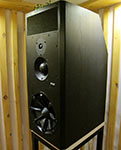| Author
|
DC Filter in masstering limiter
|
Alien Bug
IsraTrance Junior Member

Started Topics :
27
Posts :
682
Posted : May 18, 2012 12:13:22
|
|
xoC
Cubic Spline

Started Topics :
10
Posts :
179
Posted : May 18, 2012 14:01
|
A DC filter is never "always" used in the mastering process.
A DC filter introduces phase shift (if minimum phase) or pre-ringing (if linear phase), that alters the way the low end sounds. So it's used only when necessary.
Still, you need to highpass a lot of sounds, to leave space in the lows for the kick and bass.
        http://www.storm-mastering.com http://www.storm-mastering.com |

|
|
makus
Overdream

Started Topics :
82
Posts :
3087
Posted : May 18, 2012 14:07
|
|
Babaluma
IsraTrance Junior Member

Started Topics :
18
Posts :
729
Posted : May 18, 2012 14:28
|
Agree with xoC, it should never be used "by default", but only after extensive listening, IF it improves the sound. Setting the filters cutoff frequency, order/slope, and type (min/lin phase), should all be done by ear. You need to be aware of the problems/side effects introduced by any processing that you do. I know one well known client who has rejected masters from some very famous ME's because they routinely cut out everything below 40/30/20 Hz, and he likes to use sub-audio frequencies at 18Hz and below.
Another related issue is the "monoing" of LF information, which is technically called an elliptical EQ. Bob Ohlsson (look him up), once said that "The down side of elliptical filters is that our sense of size comes mostly from out of phase low frequency perception". So if we throw that information away, or mono it, we can loose a lot of our sense of space and depth in the music.
Removal of DC offset is another topic really, and is almost never necessary with well recorded tracks, even less so if everything has been produced ITB.
I have three places I might sometimes use a HPF in the chain, BUT ONLY IF NEEDED:
1) A digital EQ (DDMF LP10) right before the DAC/analogue chain, as this frees up some analogue headroom, and will stop the compressors clamping down on sub audio frequencies.
2) At the end of the analogue chain and just before the capture ADC. I use a Bax EQ for this, and if you use a lot of bass boost around 74Hz, for example, engaging the HPF can let you boost more, without introducing a lot of sub audio, headroom eating information. Result equals louder audible bass AND more headroom.
3) Just before the digital limiter, after the capture ADC. I mainly use Voxengo Elephant, which has an excellent HPF, with variable cutoff, slope and type. I'll usually only engage this if the client has asked for RIDICULOUSLY LOUD, as smashing things that much can create a DC offset in itself.
I should also note that most people's listening environments (room & monitor combo) will not be flat or extended enough to make adjustments like this accurately. A great pair of cans with a great headphone amp can help though!
To finally address the OP, I'd say that HPF individual tracks in the mix is a great idea, if they are not "bass" instruments, but do be careful you don't loose warmth too. Having said that, a lot of things I receive for mastering are very muddy in the low mids around 300-500Hz, and could have definitely benefited from more HPF on the individual tracks.
        http://hermetechmastering.com : http://www.discogs.com/artist/Gregg+Janman : http://soundcloud.com/babaluma http://hermetechmastering.com : http://www.discogs.com/artist/Gregg+Janman : http://soundcloud.com/babaluma |

|
|
Alien Bug
IsraTrance Junior Member

Started Topics :
27
Posts :
682
Posted : May 18, 2012 14:54
|
|
Alien Bug
IsraTrance Junior Member

Started Topics :
27
Posts :
682
Posted : May 18, 2012 14:58
|
|
Babaluma
IsraTrance Junior Member

Started Topics :
18
Posts :
729
Posted : May 18, 2012 17:54
|
|
PoM
IsraTrance Full Member

Started Topics :
162
Posts :
8087
Posted : May 18, 2012 19:31
|
Quote:
|
On 2012-05-18 14:01, xoC wrote:
A DC filter is never "always" used in the mastering process.
A DC filter introduces phase shift (if minimum phase) or pre-ringing (if linear phase), that alters the way the low end sounds. So it's used only when necessary.
Still, you need to highpass a lot of sounds, to leave space in the lows for the kick and bass.
|
|
+1
it seems dc offset is very rarely a problem in mastering anyway.
technically the less filters the best as it can even rise the peaks or introduce pre ringing when using linear phase..now if it become audible when cuting that low is something else.. you need accurate full range monitoring to judge..but technically it s best to avoid filtering the low as much as you can if after transparent sound.
monitoring is very important to judge these things,for example on some monitors that don t go low it can happen to not hear are some highpass filters at 30 or even 40 hz can change a lot the sound.
about dc i could be totaly wrong but to me it seems lot of the process that can introduce dc have a filter at the outpout builtin to remove it ...some synths, some distortions have one for example so it s not that common to have dc offset to me when using modern gears/plugins...now maybe with old stuff it can happen more have no idea.. |

|
|
Equilizyme
IsraTrance Junior Member

Started Topics :
19
Posts :
593
Posted : May 18, 2012 19:52
|
Quote:
|
On 2012-05-18 17:54, Babaluma wrote:
Sorry if my previous answer was too long and involved,
|
|
long answers are nice for those of us who are non-experts trying to learn  thank you! thank you! 
        -- --
http://soundcloud.com/equilizyme
-- |

|
|
faxinadu
Faxi Nadu / Elmooht

Started Topics :
282
Posts :
3394
Posted : May 19, 2012 08:01
|
|
Alien Bug
IsraTrance Junior Member

Started Topics :
27
Posts :
682
Posted : May 19, 2012 12:58
|
|
Babaluma
IsraTrance Junior Member

Started Topics :
18
Posts :
729
Posted : May 19, 2012 14:45
|
Badly designed or older analogue gear COULD introduce DC offset, but any mastering grade analogue processor will not introduce any. If you are using transformer balanced analogue gear (like me, ten of them in the chain), then one of the "side effects" of transformers is to completely remove DC offset.
So I'd say your hypothesis is wrong, there's no need to use a DC blocking filter in a digital limiter just because of the preceding analogue stages.
And your English is great!  I know how that feels, I was living in Japan for 12 years and am now in Italy, the language barrier is always a problem for me! I know how that feels, I was living in Japan for 12 years and am now in Italy, the language barrier is always a problem for me!
        http://hermetechmastering.com : http://www.discogs.com/artist/Gregg+Janman : http://soundcloud.com/babaluma http://hermetechmastering.com : http://www.discogs.com/artist/Gregg+Janman : http://soundcloud.com/babaluma |

|
|
daark
IsraTrance Full Member

Started Topics :
58
Posts :
1397
Posted : May 19, 2012 19:49
|
i'm sorry if i'm ignorant but why all(99.99%) of the released material have a low cut then?
just saying i see the bottom end way down.
don't know i was sure i need to cut away the not audible very low frequencies to gain headroom to boost the low end. could be wrong and its not a must in psytrance.        http://soundcloud.com/magimix-1/chilling-forest-whispers http://soundcloud.com/magimix-1/chilling-forest-whispers
Wierd shit happens :) |

|
|
Babaluma
IsraTrance Junior Member

Started Topics :
18
Posts :
729
Posted : May 21, 2012 11:36
|
most audio gear will start to roll off somewhere down there, often due to DC blocking capacitors in the circuits. it's just a matter of where. it's not a case of "how low can you go", but more "how much bass do you actually need"?
where are you seeing these low cuts, where do they start to roll off, and where are they 6dB down?
there's also the fact that many people will automatically roll off anything they can't hear, from about 40Hz down, just out of habit.
        http://hermetechmastering.com : http://www.discogs.com/artist/Gregg+Janman : http://soundcloud.com/babaluma http://hermetechmastering.com : http://www.discogs.com/artist/Gregg+Janman : http://soundcloud.com/babaluma |

|
|
makus
Overdream

Started Topics :
82
Posts :
3087
Posted : May 21, 2012 14:17
|
Quote:
|
On 2012-05-21 11:36, Babaluma wrote:
there's also the fact that many people will automatically roll off anything they can't hear, from about 40Hz down, just out of habit.
|
|
very true, all over there.
       
www.overdreamstudio.com |

|
|